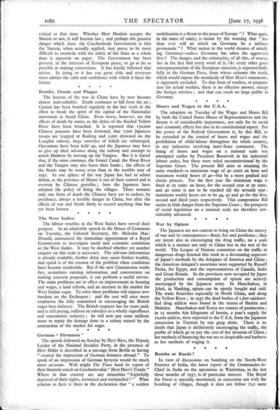Hours and Wages in the U.S.A.
The adoption on Tuesday of the Wages and Hours Bill by both the United States House of Representatives and the Senate is of considerable importance, not only for its social and economic effects but also in its constitutional aspect. For the power of the Federal Government is, by this Bill, to be extended to the control of hours and wages and the prohibition of child-labour throughout the whole country, in any industries involving inter-State commerce. The fixing of hours and wages on a national scale was attempted earlier by President Roosevelt in his industrial labour codes, but these were ruled unconstitutional by the Supreme Court. The present Bill aims at attaining the same standard—a minimum wage of 4o cents an hour and maximum weekly hours of 4o—but by a more gradual and elastic process. For the first year the minimum wage is fixed at 25 cents an hour, for the second year at 3o cents, and 4o cents is not to be reached till the seventh year ; maximum weekly hours are to be 44, 42 and 4o for the first, second and third years respectively. This compromise Bill seems in little danger from the Supreme Court ; the prospects of social legislation on a national scale are therefore con- siderably advanced.


















































 Previous page
Previous page